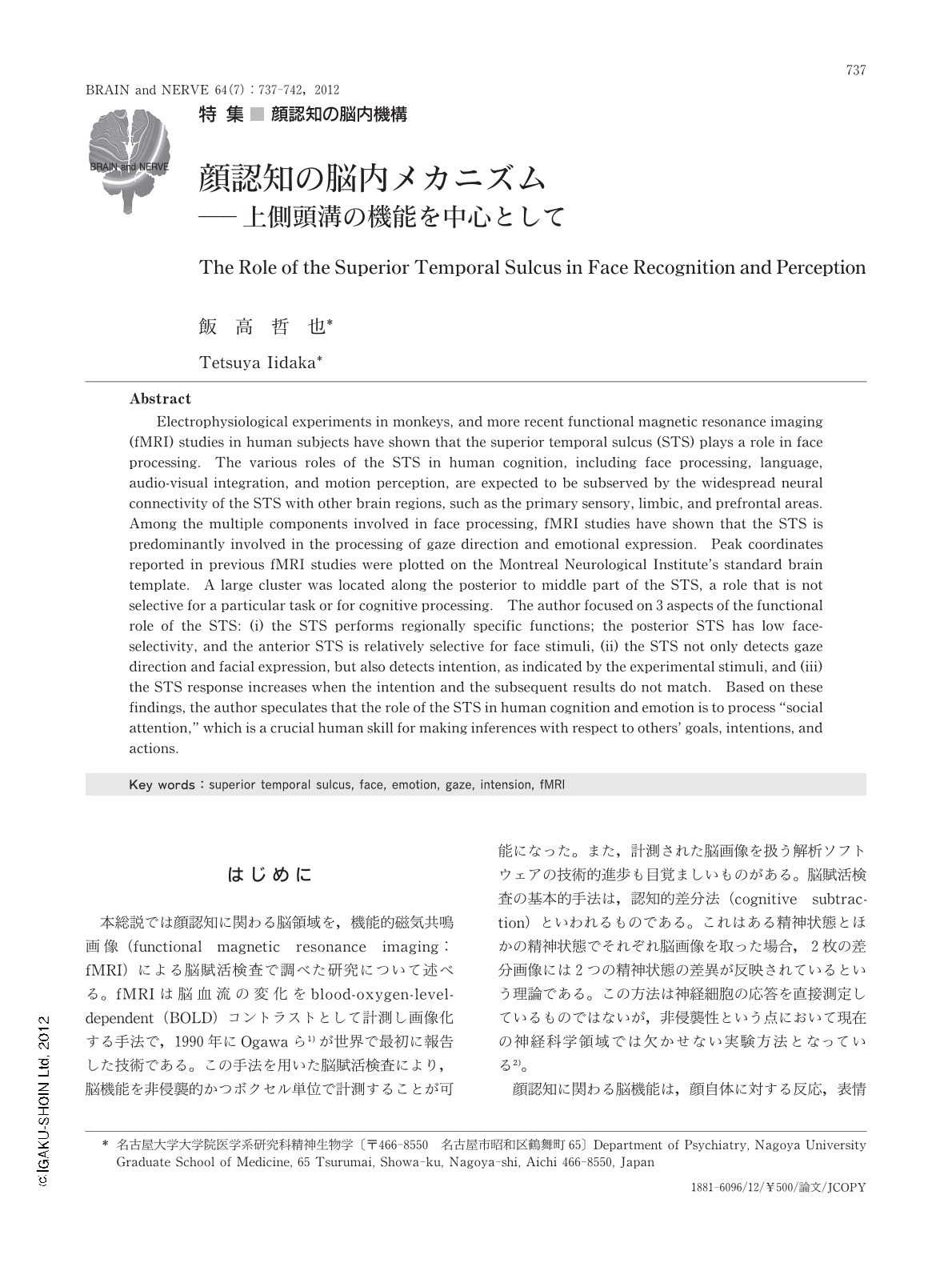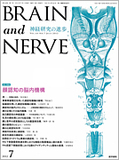Japanese
English
- 有料閲覧
- Abstract 文献概要
- 1ページ目 Look Inside
- 参考文献 Reference
はじめに
本総説では顔認知に関わる脳領域を,機能的磁気共鳴画像(functional magnetic resonance imaging:fMRI)による脳賦活検査で調べた研究について述べる。fMRIは脳血流の変化をblood-oxygen-level-dependent(BOLD)コントラストとして計測し画像化する手法で,1990年にOgawaら1)が世界で最初に報告した技術である。この手法を用いた脳賦活検査により,脳機能を非侵襲的かつボクセル単位で計測することが可能になった。また,計測された脳画像を扱う解析ソフトウェアの技術的進歩も目覚ましいものがある。脳賦活検査の基本的手法は,認知的差分法(cognitive subtraction)といわれるものである。これはある精神状態とほかの精神状態でそれぞれ脳画像を取った場合,2枚の差分画像には2つの精神状態の差異が反映されているという理論である。この方法は神経細胞の応答を直接測定しているものではないが,非侵襲性という点において現在の神経科学領域では欠かせない実験方法となっている2)。
顔認知に関わる脳機能は,顔自体に対する反応,表情の認識に関わる反応,顔の動きに対する反応,顔の記憶や有名人顔に対する反応など広範囲にわたっている。最近では顔の印象や信頼できるかどうかなど,顔認知の社会的側面への興味も広がっている。研究対象となる脳領域も後頭葉,側頭葉,前頭葉,辺縁系などにわたっている。したがって,脳全体の活動を比較的自由に計測することができるfMRIは,このような研究目的には最適な手法といえる。本稿では顔に対する脳内の反応を,主に側頭葉外側面に位置する上側頭溝(superior temporal sulcus:STS)の活動として計測した研究について代表的なものを取り上げる。この領域は顔認知の中でも,視線の向きや表情の変化などに関係していることが知られている3)。またfMRIが普及する以前からサルの実験では,顔に対するSTS領域の神経応答が積極的に調べられていた4)。STSの働きを多面的に論じた総説では,この領域が運動知覚,言語処理,心の理論,聴覚視覚統合,顔認知のそれぞれに関係していると述べられている5)。STSを左右半球と前半・後半の4領域に分けて認知機能との関係を調べた結果では,左前半は言語処理に,左後半は顔認知と聴覚視覚統合に,右前半は言語処理に,右後半は顔認知と運動知覚にそれぞれ関係していた。
このようなSTSの多機能性は,STSと同時に活動が亢進する脳領域が広範囲にわたることと関連している5)。すなわち,STS後半部は同時に紡錘状回などの賦活を伴うことで顔認知処理を遂行し,一方MT/V5領域の活動を伴うことで運動知覚処理を遂行するということである。最近では心の理論に関わるミラー・ニューロン・システムへの情報入力が,STSを通じて行われていると考えられている6)。本総説ではSTSの機能を顔認知に限って論考し,STSの前部・後部による機能差についても検討する。本総説が医学,心理学,教育学など広い領域の読者において,顔認知研究に対する理解を深めることに役立てば幸いである。また本論文はメタ解析の手法を用いたものではなく,必ずしも該当するすべての研究報告を網羅してはいない。紡錘状回(fusiform face area:FFA)や扁桃体(amygdala)などの活動も顔認知には重要であるが本総説では触れないこととする。
Abstract
Electrophysiological experiments in monkeys,and more recent functional magnetic resonance imaging (fMRI) studies in human subjects have shown that the superior temporal sulcus (STS) plays a role in face processing. The various roles of the STS in human cognition,including face processing,language,audio-visual integration,and motion perception,are expected to be subserved by the widespread neural connectivity of the STS with other brain regions,such as the primary sensory,limbic,and prefrontal areas. Among the multiple components involved in face processing,fMRI studies have shown that the STS is predominantly involved in the processing of gaze direction and emotional expression. Peak coordinates reported in previous fMRI studies were plotted on the Montreal Neurological Institute's standard brain template. A large cluster was located along the posterior to middle part of the STS,a role that is not selective for a particular task or for cognitive processing. The author focused on 3 aspects of the functional role of the STS: (i) the STS performs regionally specific functions; the posterior STS has low face-selectivity,and the anterior STS is relatively selective for face stimuli,(ii) the STS not only detects gaze direction and facial expression,but also detects intention,as indicated by the experimental stimuli,and (iii) the STS response increases when the intention and the subsequent results do not match. Based on these findings,the author speculates that the role of the STS in human cognition and emotion is to process "social attention," which is a crucial human skill for making inferences with respect to others' goals,intentions,and actions.

Copyright © 2012, Igaku-Shoin Ltd. All rights reserved.


